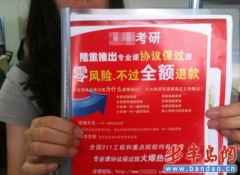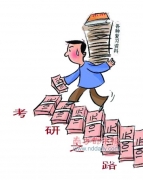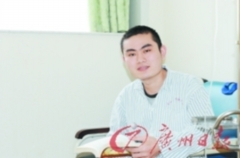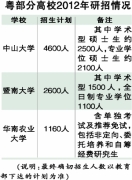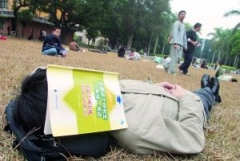|
||||
|
Section I Use of English Directions: Read the following text. Choose the best word(s) for each numbered blank and mark [A], [B], [C] or [D] on ANSWER SHEET 1. (10 points) Ancient Greek philosopher Aristotle viewed laughter as “a bodily exercise precious to health.” But ???_____some claims to the contrary, laughing probably has little influence on physical filness Laughter does _____short-term changes in the function of the heart and its blood vessels, ____ heart rate and oxygen consumption But because hard laughter is difficult to ____, a good laugh is unlikely to have _____ benefits the way, say, walking or jogging does. ____, instead of straining muscles to build them, as exercise does, laughter apparently accomplishes the ____, studies dating back to the 1930’s indicate that laughter. muscles, Such bodily reaction might conceivably help____the effects of psychological stress.Anyway,the act of laughing probably does produce other types of ______feedback,that improve an individual’s emotional state. ______one classical theory of emotion,our feelings are partially rooted _______ physical reactions. It was argued at the end of the 19th century that humans do not cry ______they are sad but they become sad when te tears begin to flow. Although sadness also _______ tears,evidence suggests that emotions can flow _____ muscular responses.In an experiment published in 1988,social psychologist Fritz. 1.[A]among [B]except [C]despite [D]like 2.[A]reflect [B]demand [C]indicate [D]produce 3.[A]stabilizing [B]boosting [C]impairing [D]determining 4.[A]transmit [B]sustain [C]evaluate [D]observe 5.[A]measurable [B]manageable [C]affordable [D]renewable 6.[A]In turn [B]In fact [C]In addition [D]In brief 7.[A]opposite [B]impossible [C]average [D]expected 8.[A]hardens [B]weakens [C]tightens [D]relaxes 9.[A]aggravate [B]generate [C]moderate [D]enhance 10.[A]physical [B]mental [C]subconscious [D]internal 11.[A]Except for [B]According to [C]Due to [D]As for 12.[A]with [B]on [C]in [D]at 13.[A]unless [B]until [C]if [D]because 14.[A]exhausts [B]follows [C]precedes [D]suppresses 15.[A]into [B]from [C]towards [D]beyond 16.[A]fetch [B]bite [C]pick [D]hold 17.[A]disappointed [B]excited [C]joyful [D]indifferent 18.[A]adapted [B]catered [C]turned [D]reacted 19.[A]suggesting [B]requiring [C]mentioning [D]supposing 20.[A]Eventually [B]Consequently [C]Similarly [D]Conversely Section II Reading Comprehension Part A Directions: Read the following four texts. Answer the questions below each text by choosing [A], [B], [C] or [D]. Mark your answers on ANSWER SHEET 1. (40 points) Text 1 The decision of the New York Philharmonic to hire Alan Gilbert as its next music director has been the talk of the classical-music world ever since the sudden announcement of his appointment in 2009. For the most part, the response has been favorable, to say the least. “Hooray! At last!” wrote Anthony Tommasini, a sober-sided classical-music critic. One of the reasons why the appointment came as such a surprise, however, is that Gilbert is comparatively little known. Even Tommasini, who had advocated Gilbert’s appointment in the Times, calls him “an unpretentious musician with no air of the formidable conductor about him.” As a description of the next music director of an orchestra that has hitherto been led by musicians like Gustav Mahler and Pierre Boulez, that seems likely to have struck at least some Times readers as faint praise. For my part, I have no idea whether Gilbert is a great conductor or even a good one. To be sure, he performs an impressive variety of interesting compositions, but it is not necessary for me to visit Avery Fisher Hall, or anywhere else, to hear interesting orchestral music. All I have to do is to go to my CD shelf, or boot up my computer and download still more recorded music from iTunes. Devoted concertgoers who reply that recordings are no substitute for live performance are missing the point. For the time, attention, and money of the art-loving public, classical instrumentalists must compete not only with opera houses, dance troupes, theater companies, and museums, but also with the recorded performances of the great classical musicians of the 20th century. There recordings are cheap, available everywhere, and very often much higher in artistic quality than today’s live performances; moreover, they can be “consumed” at a time and place of the listener’s choosing. The widespread availability of such recordings has thus brought about a crisis in the institution of the traditional classical concert. One possible response is for classical performers to program attractive new music that is not yet available on record. Gilbert’s own interest in new music has been widely noted: Alex Ross, a classical-music critic, has described him as a man who is capable of turning the Philharmonic into “a markedly different, more vibrant organization.” But what will be the nature of that difference? Merely expanding the orchestra’s repertoire will not be enough. If Gilbert and the Philharmonic are to succeed, they must first change the relationship between America’s oldest orchestra and the new audience it hops to attract. 21. We learn from Para.1 that Gilbert’s appointment has [A]incurred criticism. [B]raised suspicion. [C]received acclaim. [D]aroused curiosity. 22. Tommasini regards Gilbert as an artist who is [A]influential. [B]modest. [C]respectable. [D]talented. 23. The author believes that the devoted concertgoers [A]ignore the expenses of live performances. [B]reject most kinds of recorded performances. [C]exaggerate the variety of live performances. [D]overestimate the value of live performances. 24. According to the text, which of the following is true of recordings? [A]They are often inferior to live concerts in quality. [B]They are easily accessible to the general public. [C]They help improve the quality of music. [D]They have only covered masterpieces. 25. Regarding Gilbert’s role in revitalizing the Philharmonic, the author feels [A]doubtful. [B]enthusiastic. [C]confident. [D]puzzled. |
| [发布者:yezi] | |||
|
 当前位置:
当前位置:



